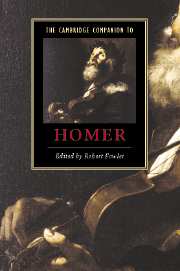Book contents
- Frontmatter
- 1 Introduction
- Part 1 The poems and their narrator
- 2 The Iliad
- 3 The Odyssey and its explorations
- 4 The story-teller and his audience
- Part 2 The characters
- Part 3 The poet’s craft
- Part 4 Text and context
- Part 5 Homeric receptions
- Dateline
- List of works cited
- Index of passages discussed
- General Index
2 - The Iliad
an unpredictable classic
from Part 1 - The poems and their narrator
Published online by Cambridge University Press: 28 May 2006
- Frontmatter
- 1 Introduction
- Part 1 The poems and their narrator
- 2 The Iliad
- 3 The Odyssey and its explorations
- 4 The story-teller and his audience
- Part 2 The characters
- Part 3 The poet’s craft
- Part 4 Text and context
- Part 5 Homeric receptions
- Dateline
- List of works cited
- Index of passages discussed
- General Index
Summary
Can the oldest text of European literature be the greatest ever composed? An epic of killing, unprecedented and sui generis in myriad ways, was perhaps completed before ink and stylus were (re-)introduced to a savage European continent, long after the crash or whimpers of the Bronze Age, citadel dominated civilisation that in some way the poem celebrates. This narrative of and meditation on death, loss and individual decisiveness became and remains fundamental for Mediterranean, European and even transatlantic literature. In the third, computerised millennium, when many still endorse Christian ethics of 'turn the other cheek' but otherwise rigorously forget former canons of honour, beauty and truth, conscientious readers anxiously confront this complex, inexplicable colossus, the Iliad. A provoked but fiercely introspective and precisely responsive young man becomes angry, and this anger trumps his community’s desperate need for help. The consequences of Akhilleus' decisions for himself, his friends and his enemies constitute the Iliad, a uniquely long and uniquely coherent poem by some one or many called 'Homer'. This synoptic consideration of its plot hopes to orient new readers to the story and provoke returning ones to consider afresh the terrifying subject, the various nature of the narrative with its inimitable pacing and episodic units, the characters, and their social and personal values nigh incomprehensible today.
- Type
- Chapter
- Information
- The Cambridge Companion to Homer , pp. 11 - 30Publisher: Cambridge University PressPrint publication year: 2004

